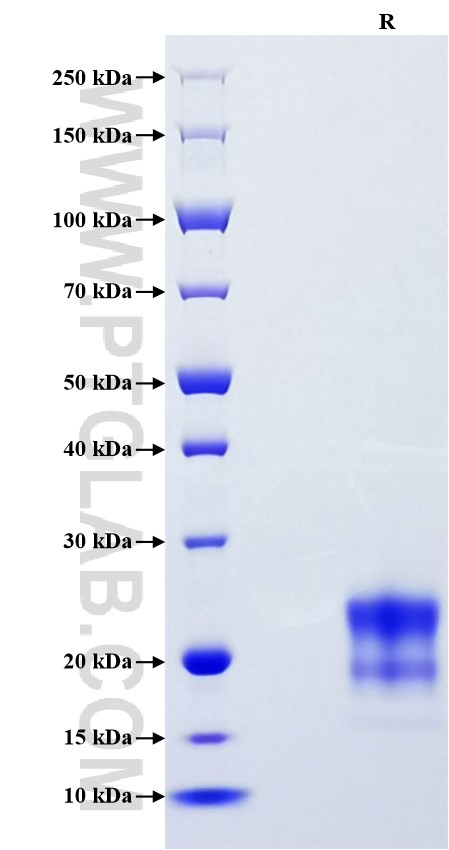Recombinant Human PGF/PIGF protein (His Tag)
种属
Human
纯度
>90 %, SDS-PAGE
标签
His Tag
生物活性
未测试
验证数据展示
产品信息
| 纯度 | >90 %, SDS-PAGE |
| 内毒素 | <0.1 EU/μg protein, LAL method |
| 生物活性 | Not tested |
| 来源 | HEK293-derived Human PGF/PIGF protein Ala21-Arg149 (Accession# P49763-2) with a His tag at the C-terminus. |
| 基因ID | 5228 |
| 蛋白编号 | P49763-2 |
| 预测分子量 | 15.6 kDa |
| SDS-PAGE | 18-25 kDa, reducing (R) conditions |
| 组分 | Lyophilized from 0.22 μm filtered solution in PBS, pH 7.4. Normally 5% trehalose and 5% mannitol are added as protectants before lyophilization. |
| 复溶 | Briefly centrifuge the tube before opening. Reconstitute at 0.1-0.5 mg/mL in sterile water. |
| 储存条件 |
It is recommended that the protein be aliquoted for optimal storage. Avoid repeated freeze-thaw cycles.
|
| 运输条件 | The product is shipped at ambient temperature. Upon receipt, store it immediately at the recommended temperature. |
背景信息
PlGF (placenta growth factor), also named as PGF, is an angiogenic factor which belongs to vascular endothelial growth factor (VEGF) family. The human PlGF gene is located on chromosome 14q14 and encodes 4 isoforms of PlGF. The protein is secreted as a glycosylated homodimer and PlGF-1 and -3 are diffusible isoforms whereas PlGF-2 and PlGF-4 have heparin binding domains. PlGF was originally identified in the placenta, where it regulates growth and differentiation of trophoblasts. It is also expressed in umbilical vein endothelial cells and other non-placental tissues, like the thyroid gland and developing lung tissue. PlGF has angiogenic properties, enhancing survival, growth and migration of endothelial cells in vitro, and promotes vessel formation in certain in-vivo models. Serum levels of PIGF and sFlt-1 (also known as soluble VEGF receptor-1) are altered in women with preeclampsia. PIGF is a potential biomarker for preeclampsia, a condition in which blood vessels in the placenta are too narrow, resulting in high blood pressure.
参考文献:
1.KhalilA.etal.(2008)PLoSOne.23;3(7):e2766. 2.DewerchinM.etal.(2012)ColdSpringHarbPerspectMed.1;2(8). 3.OuraH.et.at.(2003)Blood.101(2):560-7. 4.DuhigKE.etal.(2019)Lancet.393(10183):1807-1818.
